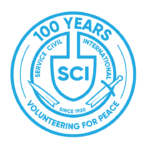GAIA MicroGrants – Call for Selection Team members
-
Do you want to become more involved in the “Climate for Peace” programme?
-
Do you want to learn more about SCI activist projects around the world?
-
Do you want to support SCI activists in their work towards climate justice?
If you answer “YES” to these questions, then keep reading…
GAIA MicroGrants team is entering its 5th phase, during which we will focus on supporting projects related to frontline communities preparing for climate change and making our food systems more sustainable. Climate change is already impacting the lives of millions of people, especially in the Global South, and communities around the world are experiencing food shortages or inequality of food distribution – in the 5th phase we will focus mostly on providing support to SCI’s branches and groups from the Global South.
Each project will be submitted to the Selection Team consisting of three volunteers, who assess them according to a set of particular criteria. You can become part of this selection team!
TASKS – You will be expected to:
-
Familiarize yourself with programme documents;
-
Read all applications (we expect around 12 applications, incoming on a rolling basis) and assess them according to programme criteria;
-
Attend monthly Skype meetings;
-
Act as a contact person for approximately four of the accepted projects (answer possible questions, remind about upcoming deadlines, review the evaluation report).
You will be supported by the programme facilitator and other team members. All ork takes place online and we will foster a friendly and open atmosphere.
REQUIREMENTS – We are looking for SCI activists who are:
-
Familiar with concepts of climate justice and sustainable living (you don’t need to be an expert, but background knowledge is necessary);
-
Active members of SCI branch or working group;
-
Available to regularly respond to emails and participate in monthly Skype meetings;
-
Ready to remain involved throughout the entire duration of the programme phase (from mid-April until the end of 2018);
-
Willing to devote 2-6 hours each month to tasks related to the programme.
BENEFITS – What do you gain in return:
-
Contribute to promotion of climate justice and sustainable living across SCI;
-
Get an overview of SCI activist initiatives around the world;
-
Build up your experience in project management and implementation.
Send your motivation letter (max. one A4 page) to microgrants@sci.ngo. Deadline for applications – April 20, 2018.
many greetings
Sara
-- Sara Turra - International Coordinator SCI - International Secretariat Belgiëlei 37, B-2018 Antwerp - Belgium Skype address: Sara Turra IS SCI Phone: +32 3 2265727 www.sci.ngo

